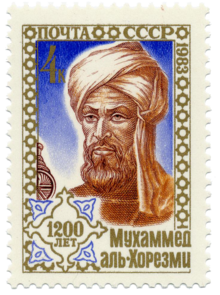Muhammad ibn Mūsā al-Khwārizmī
9th-century mathematician and astronomer
Muḥammad ibn Mūsā al-Khwārizmī (محمد بن موسی خوارزمی) or al-Khwarizmi (c.780 - 850) was a Persian mathematician, astronomer, astrologer and geographer.

| This article about a mathematician is a stub. You can help out with Wikiquote by expanding it! |
Quotes
edit- That fondness for science, … that affability and condescension which God shows to the learned, that promptitude with which he protects and supports them in the elucidation of obscurities and in the removal of difficulties, has encouraged me to compose a short work on calculating by al-jabr and al-muqabala , confining it to what is easiest and most useful in arithmetic.
- As quoted in: Victor J. Katz (2009) A history of mathematics: an introduction. p. 271
Quotes about al-Khwarizmi
edit- Multicultural education is certainly important, but it should not be about bundling children into preordained faith schools. Awareness of world civilisation and history is necessary. Religious madrasas may take little interest in the fact that when a modern mathematician invokes an "algorithm" to solve a difficult computational problem, she helps to commemorate the secular contributions of Al-Khwarizmi, the great ninth-century Muslim mathematician, from whose name the term algorithm is derived ("algebra" comes from his book, Al Jabr wa-al-Muqabilah). There is no reason at all why old Brits as well as new Brits should not celebrate those grand connections. The world is not a federation of religious ethnicities. Nor, one hopes, is Britain.
- Amartya Sen, "Solution to cultural confusion is freedom and reason", Financial Times (November 29, 2005)
- Of course the Arabs themselves never laid claim to the invention, always recognizing their indebtedness to the Hindus both for the numeral forms and for the distinguishing feature of place value. Foremost among these writers was the great master of the golden age of Bagdad, one of the first of the Arab writers to collect the mathematical classics of both the East and the West, preserving them and finally passing them on to awakening Europe. This man was Mohammed the Son of Moses, from Khowarezm, or, more after the manner of the Arab, Mohammed ibn Mūsā al-Khowārazmī, a man of great learning and one to whom the world is much indebted for its present knowledge of algebra and of arithmetic. Of him there will often be occasion to speak; and in the arithmetic which he wrote, and of which Adelhard of Bath (c. 1130) may have made the translation or paraphrase, he stated distinctly that the numerals were due to the Hindus. This is as plainly asserted by later Arab writers, even to the present day. Indeed the phrase ilm hindī, "Indian science," is used by them for arithmetic, as [is] also the adjective hindī alone.
- David Eugene Smith & Louis Charles Karpinski, The Hindu-Arabic Numerals (1911) Ch. I. Early Ideas of Their Origin, pp. 4-5.
- [T]here is a possibility that some of the works ascribed to Sened ibn 'Alī are really works of Al-KhowarazmI, whose name immediately precedes his.
- David Eugene Smith & Louis Charles Karpinski, The Hindu-Arabic Numerals (1911) Ch. I. Early Ideas of Their Origin, p. 10.